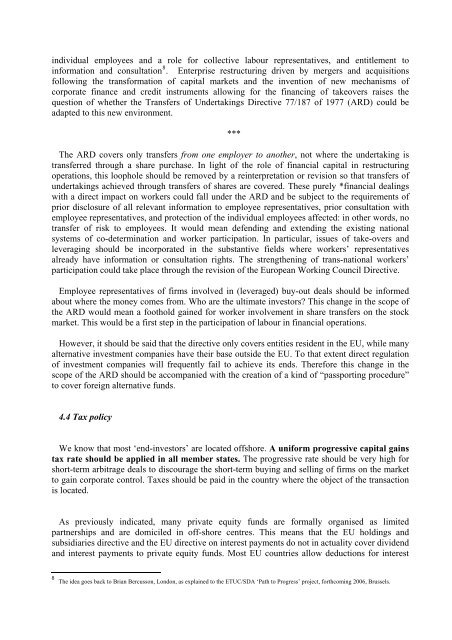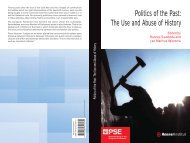Executive summary - Udo Bullmann
Executive summary - Udo Bullmann
Executive summary - Udo Bullmann
- No tags were found...
You also want an ePaper? Increase the reach of your titles
YUMPU automatically turns print PDFs into web optimized ePapers that Google loves.
individual employees and a role for collective labour representatives, and entitlement toinformation and consultation 8 . Enterprise restructuring driven by mergers and acquisitionsfollowing the transformation of capital markets and the invention of new mechanisms ofcorporate finance and credit instruments allowing for the financing of takeovers raises thequestion of whether the Transfers of Undertakings Directive 77/187 of 1977 (ARD) could beadapted to this new environment.***The ARD covers only transfers from one employer to another, not where the undertaking istransferred through a share purchase. In light of the role of financial capital in restructuringoperations, this loophole should be removed by a reinterpretation or revision so that transfers ofundertakings achieved through transfers of shares are covered. These purely *financial dealingswith a direct impact on workers could fall under the ARD and be subject to the requirements ofprior disclosure of all relevant information to employee representatives, prior consultation withemployee representatives, and protection of the individual employees affected: in other words, notransfer of risk to employees. It would mean defending and extending the existing nationalsystems of co-determination and worker participation. In particular, issues of take-overs andleveraging should be incorporated in the substantive fields where workers’ representativesalready have information or consultation rights. The strengthening of trans-national workers’participation could take place through the revision of the European Working Council Directive.Employee representatives of firms involved in (leveraged) buy-out deals should be informedabout where the money comes from. Who are the ultimate investors? This change in the scope ofthe ARD would mean a foothold gained for worker involvement in share transfers on the stockmarket. This would be a first step in the participation of labour in financial operations.However, it should be said that the directive only covers entities resident in the EU, while manyalternative investment companies have their base outside the EU. To that extent direct regulationof investment companies will frequently fail to achieve its ends. Therefore this change in thescope of the ARD should be accompanied with the creation of a kind of “passporting procedure”to cover foreign alternative funds.4.4 Tax policyWe know that most ‘end-investors’ are located offshore. A uniform progressive capital gainstax rate should be applied in all member states. The progressive rate should be very high forshort-term arbitrage deals to discourage the short-term buying and selling of firms on the marketto gain corporate control. Taxes should be paid in the country where the object of the transactionis located.As previously indicated, many private equity funds are formally organised as limitedpartnerships and are domiciled in off-shore centres. This means that the EU holdings andsubsidiaries directive and the EU directive on interest payments do not in actuality cover dividendand interest payments to private equity funds. Most EU countries allow deductions for interest8 The idea goes back to Brian Bercusson, London, as explained to the ETUC/SDA ‘Path to Progress’ project, forthcoming 2006, Brussels.





